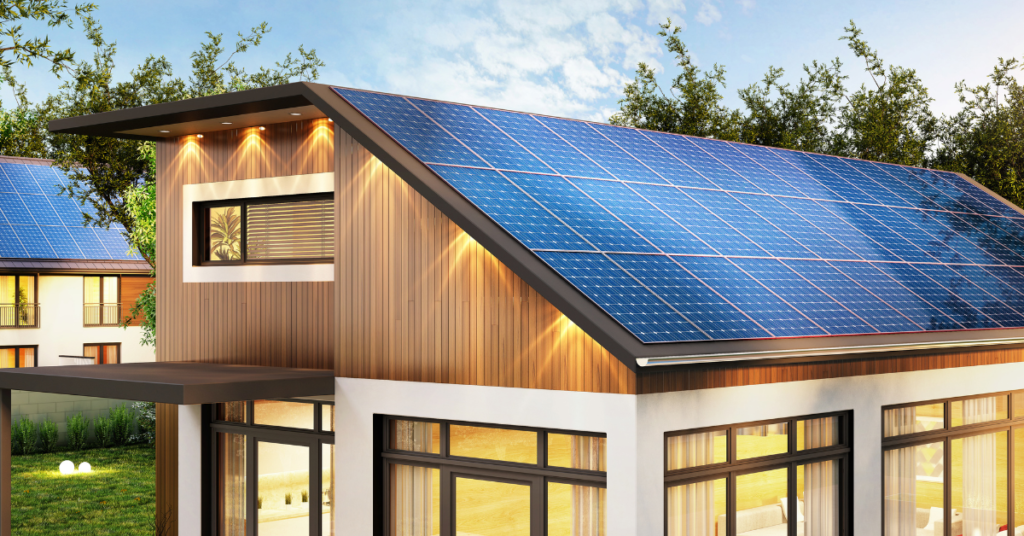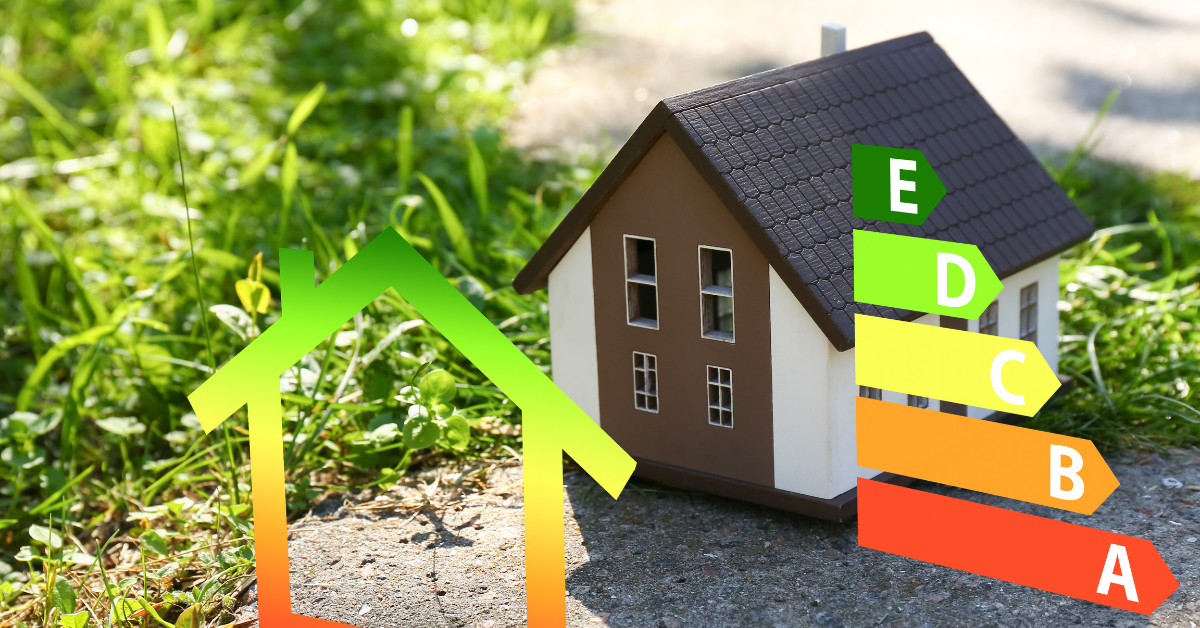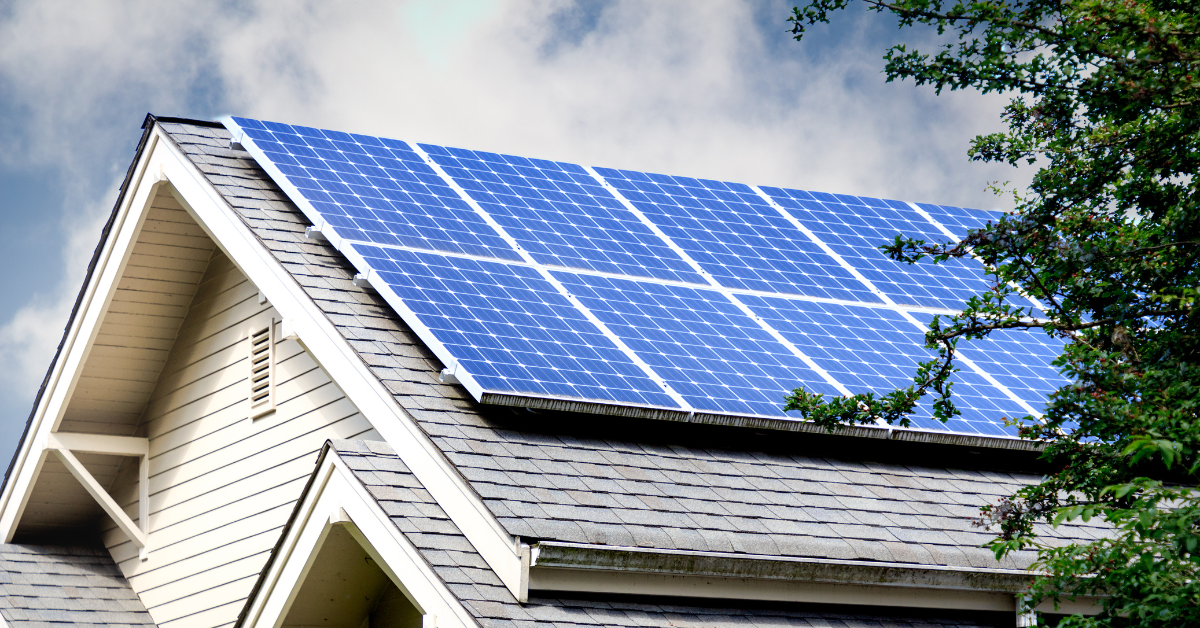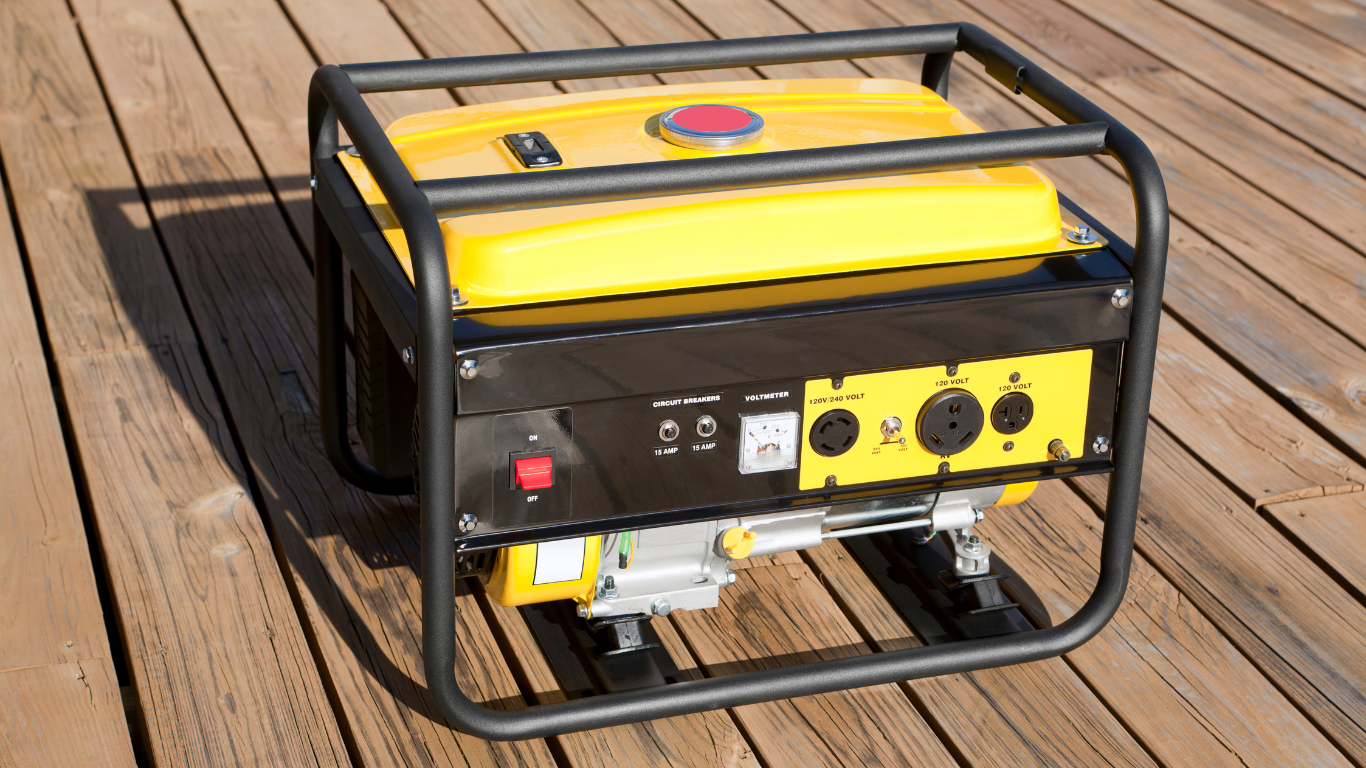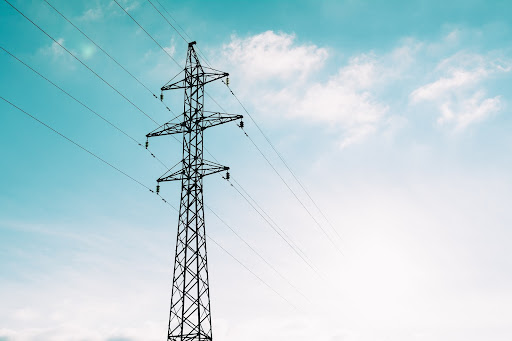Are solar panels worth it? Truthfully: it depends.
While a home solar system is a great idea for some households, it’s not worth it for others. It all depends on your specific case.
So, are solar panels worth it FOR YOU?
If you answer yes to the following questions, then installing solar panels or even an entire home solar system may be right for you.
By the end of this article, you should have a great understanding of whether getting solar panels is worth it for you.
1. Are the Benefits of a Home Solar System Enticing to You?
The first step to deciding whether solar panels are worth it for you is understanding these benefits and determining whether they are important to you personally.
Here are some of the main advantages of a home solar system:
| Benefit | Description |
| Cost Savings | One of the primary benefits of a home solar system is the potential for significant cost savings on electricity bills. By generating your own renewable energy, you can reduce or eliminate your reliance on traditional grid electricity, resulting in lower monthly utility expenses over time. |
| Energy Independence | Generating your own electricity through solar panels provides a level of energy independence. It will prepare you for power outages and emergency type situations. It offers protection against rising electricity costs and reduces your vulnerability to utility rate fluctuations. With a solar system in place, you become less dependent on the grid and can enjoy a more stable energy future. |
| Return on Investment (ROI) | A solar system is a long-term investment that can provide a favorable return on investment. Depending on factors such as system cost, energy consumption, and local incentives, homeowners can recoup their initial investment over time through energy savings and potential government incentives, such as tax credits or net metering programs. |
| Increased Home Value | Studies have shown that homes equipped with solar systems tend to have higher property values. Solar panels are seen as desirable features by homebuyers due to the potential for reduced energy costs and environmental benefits. Installing a solar system can enhance the marketability and resale value of your home. |
| Long-Term Durability | Solar panels are designed to withstand various weather conditions and can have a lifespan of 25 years or more. They require minimal maintenance, with occasional cleaning and inspections, making them a durable and reliable energy solution. |
| Incentives and Rebates | Many governments and utilities offer financial incentives, rebates, or tax credits to encourage the adoption of solar energy. These incentives can help offset the upfront costs of installing a solar system and improve the overall affordability. |
| Job Creation and Local Economy | The growth of the solar industry contributes to job creation and economic development. By investing in a solar system, you support the growth of renewable energy and contribute to local job opportunities. |
2. Are You Willing to Invest Money To Install a Solar System?

There are many undeniable benefits of getting solar panels or even a home solar system, including cost-saving, becoming energy self-sufficient, and increasing the value of your house.
But installing a solar system is not free.
The cost of a solar system depends on a variety of different factors, including the:
- Size of the system
- Type and quality of the solar panels
- Complexity of the installation
- Cost of permits and inspections
- Location of the home
- Government incentives & tax credits
Larger systems will typically cost more than smaller systems, and higher-quality panels will come with a higher price tag.
Factors that can affect installation costs include the type of roofing material, the complexity of the roof structure, and the ease of access to the installation site.
Permitting costs vary depending on the location of the home, and inspections may also be required during and after the installation process.
Here is the average cost of a solar system by size (but this can vary based on the factors mentioned above):
| System Size (kW) | Cost Range ($) | Suitable for |
| 3-5 | $8,000 – $15,000 | Suitable for small to medium-sized households |
| 6-9 | $12,000 – $22,000 | Suitable for medium to large-sized households |
| 10-15 | $18,000 – $30,000 | Suitable for larger households or commercial applications |
3. Are You Located in an Area With High Electricity Rates?
If so, installing solar panels could significantly reduce your energy bills over time and be a good reason for you to consider installing solar panels.
Surprisingly, electricity rates vary a lot from state to state. In the most expensive state, Hawaii, electricity is more than 4 times more expensive than in the cheapest state, North Dakota!
To find out how expensive electricity rates are in your state compared to other states, take a look at the tables below showing the states with the highest and lowest residential electricity costs.
The 10 States With the Most Expensive Residential Electricity Rates As of March, 2023
| State | Electricity Cost (cents per Kilowatt Hour) |
| Hawaii | 44.25 |
| Connecticut | 33.23 |
| Massachusetts | 32.39 |
| New Hampshire | 30.3 |
| Maine | 29.41 |
| Rhode Island | 28.05 |
| California | 27.15 |
| Alaska | 23.39 |
| New York | 21.18 |
| Vermont | 20.38 |
If you saw your state in the table above, getting a solar panel could save you a lot of money on your electricity bill in the long run, and may be worth it.
The 10 States With the Least Expensive Residential Electricity Rates As of March, 2023
| State | Electricity Cost (cents per Kilowatt Hour) |
| North Dakota | 9.72 |
| Idaho | 10.09 |
| Nebraska | 10.57 |
| Wyoming | 10.62 |
| Washington | 10.8 |
| Utah | 10.88 |
| South Dakota | 11.31 |
| Missouri | 11.65 |
| Louisiana | 11.85 |
| Iowa | 11.9 |
If your state is in the table above, your electricity bill may not be large enough for you to save a significant enough amount of money to justify installing a home solar system.
If your state didn’t appear in either of the tables above, your electricity rates are probably somewhere in the middle.
4. Does Your Home Receive a Lot of Direct Sunlight?
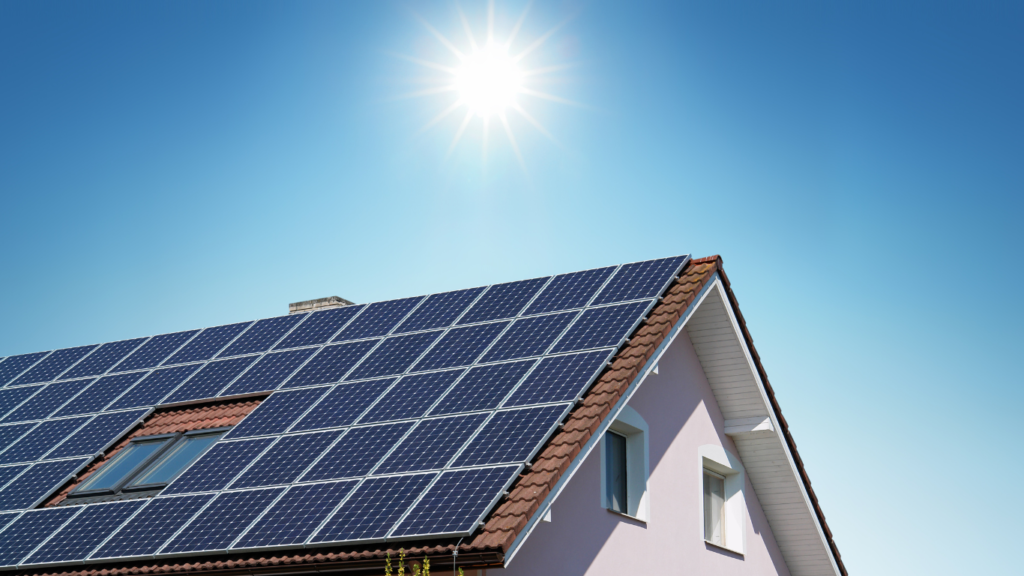
The next thing to look at is how much sunlight your geographical area gets. The more sunny your area is, the more of the sun’s energy you can harness and convert into electricity.
The states that get the most sunlight, and are therefore best for residential solar panels are mostly located in the southwest region of the United States. Arizona, Nevada, and New Mexico are among the top states that receive the highest amount of sunlight, making them ideal for solar panel installations.
Other states that have high levels of sunshine include California, Texas, Colorado, Utah, and Florida. These states are not only great for residential solar installations, but their governments also actively promote solar energy through incentives, tax breaks, and other programs.
According to Forbes, the best state for solar energy friendliness is California. The state receives nearly 150 sunny days per year, and has a very developed solar industry.
Here’s a complete list of states, from most sunniest to least, based on the average hours of sunshine they receive annually:
| State | Average Annual Sunshine Hours |
| Arizona | 3,872 |
| Nevada | 3,825 |
| New Mexico | 3,745 |
| California | 3,518 |
| Colorado | 3,303 |
| Utah | 3,120 |
| Texas | 2,928 |
| Wyoming | 2,863 |
| Florida | 2,778 |
| Oregon | 2,718 |
| Oklahoma | 2,682 |
| Kansas | 2,668 |
| Nebraska | 2,634 |
| Idaho | 2,620 |
| South Dakota | 2,618 |
| North Dakota | 2,607 |
| Montana | 2,564 |
| Louisiana | 2,555 |
| Georgia | 2,554 |
| Alabama | 2,533 |
| Mississippi | 2,534 |
| New Jersey | 2,534 |
| North Carolina | 2,518 |
| Tennessee | 2,508 |
| South Carolina | 2,507 |
| Missouri | 2,505 |
| Kentucky | 2,498 |
| Arkansas | 2,486 |
| Virginia | 2,485 |
| Hawaii | 2,451 |
| Illinois | 2,428 |
| Indiana | 2,428 |
| Ohio | 2,407 |
| West Virginia | 2,397 |
| Delaware | 2,389 |
| Maryland | 2,377 |
| Pennsylvania | 2,356 |
| Iowa | 2,342 |
| Michigan | 2,316 |
| Wisconsin | 2,269 |
| New York | 2,269 |
| Minnesota | 2,229 |
| Vermont | 2,227 |
| Connecticut | 2,225 |
| New Hampshire | 2,220 |
| Rhode Island | 2,196 |
| Massachusetts | 2,194 |
| Maine | 2,189 |
| Washington | 2,169 |
| Alaska | 2,124 |
Once you determine whether your region gets a lot of sunlight, take a look at whether your home specifically gets a lot of direct sunlight for installing solar panels:
- Assess your home’s orientation. The best orientation of a home for solar panels is a south-facing roof, although east and west-facing roofs can also work. Don’t know what direction your roof is facing? Installing a compass app on your phone will give you that answer very quickly!
- Next, determine the amount of shading on your roof from trees, buildings, or other obstructions. Shade can significantly reduce the amount of direct sunlight that your solar panels receive.
- You should also check the angle of your roof to make sure it is suitable for solar panels. A roof angle between 30-45 degrees is the most efficient for solar panels.
This quick video by SolarQuotes will give you more information on the optimal roof angles for solar panels.
5. Is Your Roof Well-Suited For Solar Panels?
Do You Have Ample Rooftop Space?
The amount of roof space required for a solar system depends in part on the size and capacity of the system you want to install, as well as the efficiency of the solar panels used.
Generally speaking, you will need about 100 square feet of roof space for every additional kW on your solar system. In other words, a 1kW solar system requires about 100 square feet of roof space, a 3kW system requires about 300 square feet of roof space, and a 5kW solar system requires about 500 square feet of roof space.
But this does not always hold true. The amount of required roof space also depends on factors like the orientation & angle of the roof and shading & obstruction, because that affects the efficiency of the solar system.
It’s important to note that solar panels can also be installed on the ground or on a pole if there isn’t enough roof space available.
Is Your Roof In Good Condition?
The condition of your roof plays a significant role in the installation of solar panels. Here are some ways in which the roof condition can impact the solar panel installation process:
- Roof Age and Stability: The age and stability of your roof are important factors to consider. Solar panels are designed to last for decades, so it’s essential to ensure that your roof is in good condition and has a remaining lifespan that aligns with the expected lifespan of the solar panels. If your roof is old or in need of repairs, it may be recommended to address any necessary maintenance or consider replacing the roof before installing solar panels.
- Roof Orientation and Tilt: The orientation and tilt of your roof affect the solar panel’s efficiency and energy production. Ideally, the roof should have a south-facing orientation in the Northern Hemisphere (or north-facing in the Southern Hemisphere) to maximize exposure to sunlight throughout the day. Additionally, the tilt angle of the roof should be considered to optimize the solar panel’s positioning for maximum sunlight absorption.
- Roof Material and Load-Bearing Capacity: Different roof materials can impact the installation process and the mounting options available for solar panels. Most solar panel systems can be installed on various roofing materials, including asphalt shingles, metal, tile, or flat roofs. However, the installation techniques may differ depending on the specific roof type. Additionally, the roof’s load-bearing capacity must be assessed to ensure it can support the weight of the solar panels and the mounting system.
- Shade and Obstructions: The presence of shade from nearby trees, buildings, or other obstructions can significantly affect the solar panel system’s performance. It’s important to evaluate the surrounding environment for potential shade issues that could reduce the amount of sunlight reaching the solar panels. Shading can lead to decreased energy production and efficiency, so it’s best to minimize or eliminate shading to maximize the system’s output.
Roof Warranty and Penetration: Installing solar panels typically involves attaching mounting hardware to the roof. It’s important to review your roof warranty and consider any potential impacts on it. Additionally, the installation process may require roof penetrations to secure the mounting system, which should be performed by experienced professionals to maintain the roof’s integrity and waterproofing.
Now you should have a good idea whether solar panels are worth it for you. If the answer is “yes,” the next step is to connect with a trusted solar expert in your area.
Don’t forget to read our full guide on becoming energy self-sufficient and independent from the grid!

